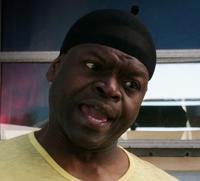 Screenwriter Robert Carlock '95 is a favorite during JAMS! -- the OFA offerings during Harvard's Wintersession. This January, he returns with a new hit on his resume: Unbreakable Kimmy Schmidt. We spoke with him about his undergrad years, writing comedy and the Hollywood biz.
Screenwriter Robert Carlock '95 is a favorite during JAMS! -- the OFA offerings during Harvard's Wintersession. This January, he returns with a new hit on his resume: Unbreakable Kimmy Schmidt. We spoke with him about his undergrad years, writing comedy and the Hollywood biz.
By Gareth Anderson '19
Robert Carlock ’95 has what can only be called an impressive resume. After writing for the Dana Carvey Show and SNL in the 1990s, he moved on to write for Friends, wrote and produced for 30 Rock, and most recently co-created (with his long-time collaborator Tine Fey) Unbreakable Kimmy Schmidt on Netflix. Carlock returns to Harvard for a JAMS! writing seminar during Wintersession on Jan. 19. The seminar almost instantly filled up, but there’s still time to sign up for the waiting list (and for other JAMS! offerings) here. I spoke with Carlock about his process, the nature of humor and the entertainment industry. An edited version of our conversation follows.

It seems as though this is changing, but late 20th century Harvard did not, in my experience, offer a lot of official encouragement to creative endeavors. I did an independent study in creative writing that felt vaguely illicit; anything that wasn't geared towards a career in banking was palpably outside the college's institutional raison d'être. I wrote for the Lampoon starting in my freshman year and that was certainly formative. I met and was forced to measure myself against some brilliantly funny and inventive and talented people there. Consequently, the College generally disapproved of our existence.
Were you always inspired to become a screenwriter?
I have come to love writing for performance and creating stories, but it's not what I always aspired to. I thought my creative bent would end up in more respectable lying-based fields like advertising or consulting or the law. But as a senior I visited a friend who was working at Saturday Night Live and that seemed like more fun and less shaving.
Humor is an important part of your work.For the aspiring humorists reading this, what is your advice for writing good comedy? Where do you find your humor?
Oof. I don’t know. Start in a real place. Just as in fantasy or an action sequence or a horror movie, comedy relies on what Coleridge was the first – I think – to note a “suspension of

You are very involved in the entertainment industry, which is ever-changing. With the rise of new mediums of entertainment, and new content creators such as Netflix, Amazo, and Hulu, do you see changes in the ways that you perform your work? How are these changes affecting the ways that screenwriters write?
In terms of my day-to-day, it's not exactly a sea change. It's a boon having all these other platforms to sell to, that's for sure. I am a great believer in and lover of broadcast television and even appreciate the limitations it imposes. Limitations can be a good thing. Nevertheless, a digital universe has allowed for programming that would likely never exist on broadcast, and that is welcome and encouraging. Bingeing lets us play with narrative time and sequence more. We spend fewer pages doing exposition to make sure our audience is caught up. Running time is less of a concern, which allows for fuller stories for more characters. In short, there are fewer impediments – like Standards to Ad Sales or network relationships with the NFL – to our doing the stories we want to do and that at least gives us writers a new kind of false hope to feed on.